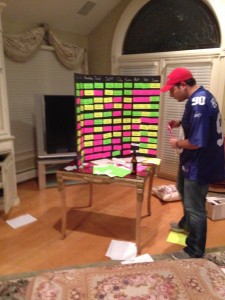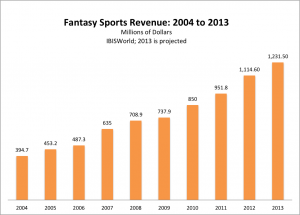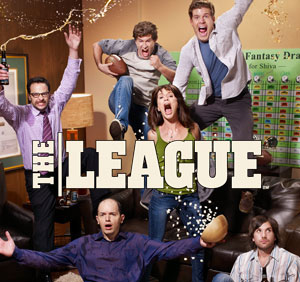The Fantasy Sports Industry is Taking American Business by Storm
by jschwarz | December 19, 2013 2:06 pm
By JOSH SCHWARZ
The fantasy sports industry is growing at exponential rates that are expected to continue thanks to social media and mobile technology.
 [1]
[1]PHOTO/Josh Schwarz
Fantasy sports are online games that allow users to build teams and reap rewards for the performances of real-life athletes. They are taking North America by storm, and became a thriving business in the last decade, with revenue rising by more than ten percent each year.
“More and more people are realizing that it’s a really cool way to stay up to date on news and watch and watch the sports world grow,” said Pete Jensen, a fantasy hockey analyst and producer for NHL.com[2]. “It keeps the fans engaged and the whole coverage of a sport comes full circle.”
Emphasis on interactivity and our ample use of technology are coined as major reasons investors and participants are turning profit on an idea that started just for fun. With everybody walking around with the Internet in their pockets these days, and each fantasy sports host offering free applications to connect fans to their respective teams, audiences are more engaged than they’ve ever been.
“Every sports fan I know is playing fantasy football, or a fantasy game of some kind at least,” said Anthony Crespo, a 25-year-old graduate student at Rutgers who has played fantasy football for the past seven years. “It makes the games more compelling to watch when you have other interests besides just a team winning or losing. It’s a fun way to compete against your friends and show off your sports knowledge.”
Rapid Growth
The fantasy sports industry has grown an average of 11.7 percent per year between 2008 and 2013 and currently more than 33 million people are participating, according to market research company IBIS World.[3]
Similar to other Internet-based industries, fantasy sports websites generate revenue from advertising. Just as Google and other search engines faced criticism and doubt in their initial stages, fantasy platforms have overcome the doubters and greatly rewarded those that got in on the party early.
It’s easy to see why fantasy sports have gotten so big for users and for businesses. For users, fantasy sports are another way to briefly escape from reality at no cost.
Most games are free to play, and offer endless customizations to make each league unique to the users’ liking. For example, since fantasy sports are based on performances in real life, each fantasy league’s “commissioner” has the ability to alter variables like which stats receive points, number of players in the league, playoff formats, and much more.
Some of the biggest names in fantasy sports hosting, such as Yahoo![4] and ESPN[5], now offer fantasy games for hockey, soccer, NASCAR, and even golf, after seeing the rise in popularity of fantasy football, baseball, and basketball.
Role of Technology
These days, when everybody has a smartphone in their hand or a computer on their lap, fantasy sports are in business around the clock. It’s no longer just about the games. Determined fantasy participants are constantly checking Twitter for player and team updates, doing research on statistics, making trades with other users, and much more. Why else would ESPN’s NFL Insider Adam Schefter have over 2.5 million followers on Twitter?[6]
 [7]
[7]PHOTO/ IBIS World
Every fantasy platform has an application available for smartphones, and the Internet usage is carrying this industry to unforeseen heights.
“It’s an ongoing battle,” said Crespo. “Everybody wants to be the first to hear about an up-and-coming player and then go add them to their roster. But don’t get me wrong, it can be as frustrating as it is fun.”
Websites have intelligently also started to add social media-type aspects to their fantasy sections. For example, Yahoo! offers each fantasy league its own message board and a section where users can post ‘smack talk’ to their opponents. The interactivity makes each fantasy league a social network in itself and keeps users coming back for more.
For businesses and investors, what once was a sideshow to the actual games is becoming now front and center. The fantasy aspect of sports is constantly being integrated into the real sports world. For example, when you used to only see other scores on the ticker running at the bottom of the television screen during games, you now see fantasy stats. Also, major sports networks such as ESPN and NFL Network have opened up time slots for fantasy-specific shows where users watch to receive advice from experts.
Crespo, who earned a bachelor’s degree in business at Fordham University, says that fantasy sports are comparable to certain aspects of the business world.
“I went through school aiming to be on Wall Street one day,” he said. “Even though my goals have changed since then, I get my ‘fix’ through fantasy football. It’s actually really similar. I view players just like stocks; you have to assess their value and the price you can get them at to determine if the investment will pay off in the long-run.”
New Opportunities
Not only has the growth of the fantasy sports industry shifted culture among sports fans, but it has shifted the sports economy as well, creating new employment opportunities in the sports community.
The Fantasy Sports Services market research report[8] shows that as of June 2013, there were 4,048 employees working for 273 fantasy sports-specific businesses.
The fantasy boom created tons of new jobs. Fantasy insiders relay useful sports information to the participants, fantasy experts offer advice and rankings via the Web and social media, and producers, like Jensen, edit articles and compile statistics to make a fantasy website function for its users.
Jensen, who graduated from Penn State, said he always liked fantasy sports but didn’t consider it something he would focus his career on at the time.
“When I was at [Penn State] I was always into playing fantasy hockey, football, and baseball with my friends,” he said. “When I started working for NHL.com they asked me if I wanted to try doing fantasy-related stuff because it was really starting to get popular. It’s a really interesting angle to sports reporting.”
Some are trying to push the business aspect of fantasy sports even further. Fantex Inc. announced earlier this year that they would be offering real stock options in real professional athletes.
The corporation caused a real stir with its innovative idea that essentially turns fantasy into reality. Fantex would allow investors to buy real stock in a specific player. The stock would be affected by not only the athletes’ on-field performance, but also overall economic value (i.e. endorsements, contracts). There are many doubters, but also many who see a lot of potential.
[WATCH: Fantasy/Business enthusiasts react to Fantex. Use FULL-SCREEN to watch][9]
“When you look at the economic advance of fantasy sports, I think it’s an idea that has great potential,” Jensen said. “Any platform that you can bring this kind of economic value to is worth a try, especially with the advertising money you see these days.
Fantex delayed its Initial Public Offering when their poster boys, NFL stars Arian Foster and Vernon Davis suffered injuries this season. But it is only a postponement. Fantex still plans to deliver this unique opportunity to interested investors.
A ‘League’ of Its Own
One way to tell that fantasy sports, and fantasy football specifically, have made it big time is that there is a very successful television show with a premise surrounding them.
 [10]
[10]PHOTO/adclub.org
The League is a sitcom that follows a group of friends and their fantasy football league. Each season of the show starts with their fantasy football draft, and ends with the championship. The show is aligned simultaneously with the real NFL season, and includes plenty of guest appearances from big-time football players such as reigning NFL MVP Adrian Peterson. Essentially, it’s the perfect show for fantasy enthusiasts.
“Even besides the fantasy football references, [The League] is just one of the funniest shows on TV,” said Kristen Tamke, 32, a family psychologist and fantasy football fan. “I love how it goes along with football season and it never fails to make me laugh.”
Just as impressive is the fact that the show, which just finished its fifth season, has spent every season as part of an hour-long block with the hit comedy It’s Always Sunny in Philadelphia. Sunny’s success took off before The League first aired, but The League has more than held its own.
This past season, both shows were moved from FX to FXX, the new sister network that used The League and It’s Always Sunny in Philadelphia to promote the channel change. FX Productions CEO John Landgraf said that this year’s premiers of both shows far exceeded expectations despite the channel change, according to The Hollywood Reporter.[11]
Tamke pointed to the show’s relatability as the reason for its success.
“It’s just like watching a group of people that you could easily be your own friends,” she said. “They go to bars, make fun of each other, and talk fantasy football!”
One specific aspect of The League is particularly relatable for Tamke.
“I love Jenny, she is by far my favorite character,” Tamke said. “I feel like she’s just like me; [Jenny] can hang with the boys and talk football, but she still gets underestimated because she’s a girl!”
The League was renewed for a sixth 13-episode season before the fifth even aired. It will debut in Fall 2014.
- [Image]: http://class1.ramaporecord.org/2013/12/19/the-fantasy-sports-industry-is-taking-american-business-by-storm/photo-28/
- NHL.com: http://www.nhl.com/
- according to market research company IBIS World.: http://www.ibisworld.com/industry/fantasy-sports-services.html
- Yahoo!: http://football.fantasysports.yahoo.com/
- ESPN: http://games.espn.go.com/frontpage/football
- over 2.5 million followers on Twitter?: https://twitter.com/AdamSchefter
- [Image]: http://class1.ramaporecord.org/2013/12/19/the-fantasy-sports-industry-is-taking-american-business-by-storm/fantasychart/
- The Fantasy Sports Services market research report: http://www.ibisworld.com/industry/fantasy-sports-services.html
- [WATCH: Fantasy/Business enthusiasts react to Fantex. Use FULL-SCREEN to watch]: http://pages.ramapo.edu/~enegron/JoshSchwarzFinal/
- [Image]: http://class1.ramaporecord.org/2013/12/19/the-fantasy-sports-industry-is-taking-american-business-by-storm/the_league/
- according to The Hollywood Reporter.: http://www.hollywoodreporter.com/live-feed/tv-ratings-sunny-league-lose-622311
Source URL: https://class1.ramaporecord.org/?p=15969